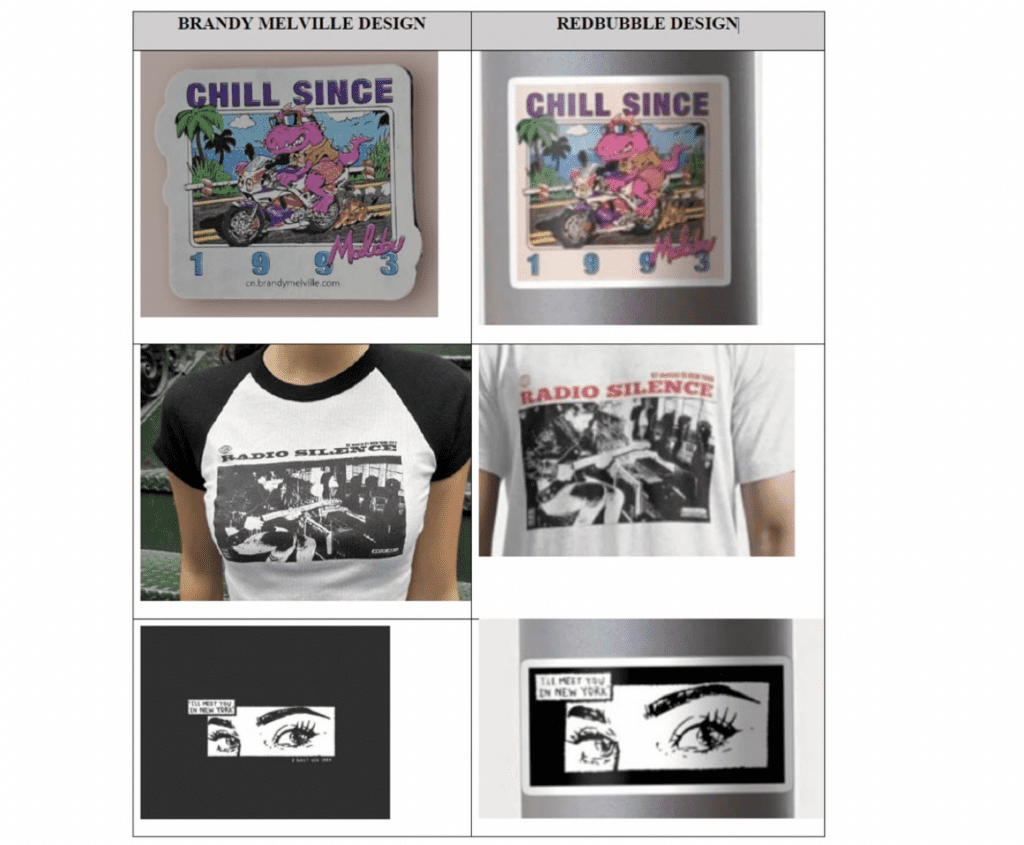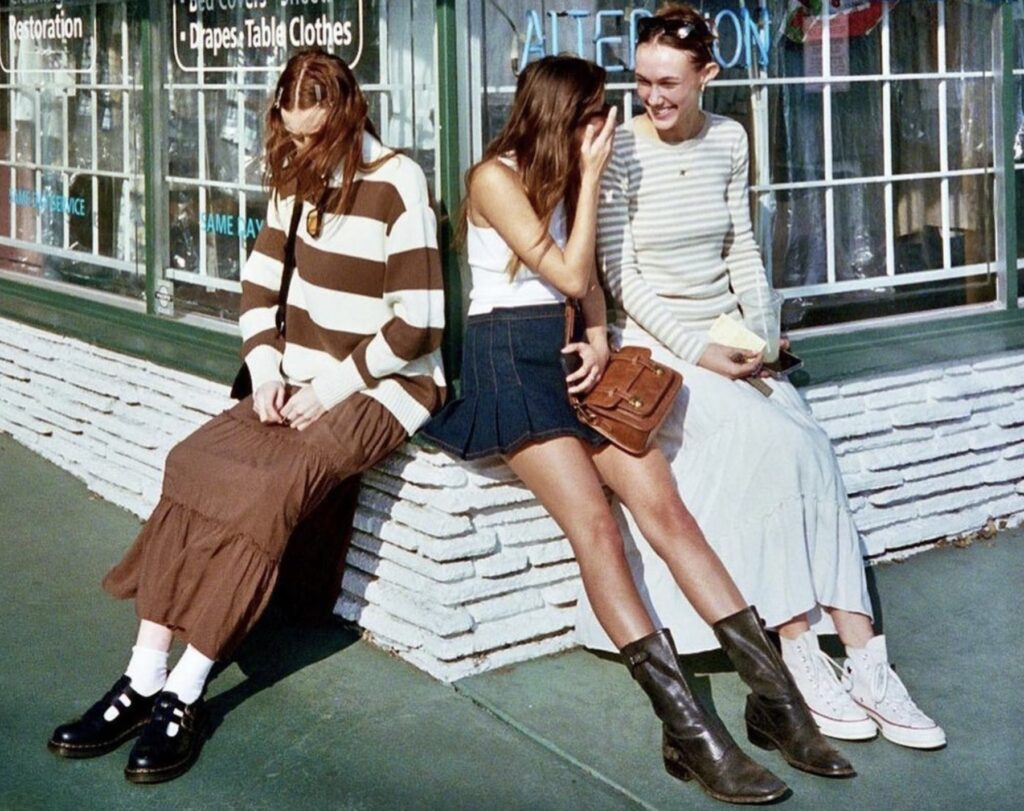A brand-new fight is underway between longstanding foes Brandy Melville and Redbubble. On the heels of the Supreme Court refusing to review a holding from the U.S. Court of Appeals for Ninth Circuit in a case that Brandy Melville previously filed against Redbubble on contributory trademark liability grounds, the teen-favored retailer has lodged a new trademark and copyright infringement complaint against Redbubble, accusing the Melbourne, Australia-based print on-demand marketplace of infringing its trademark and copyright-protected works by “creating, manufacturing, and distributing large quantities of counterfeit Brandy Melville clothing and printed material.”
In the complaint that it filed with the U.S. District Court for the Northern District of California on March 29, as first reported by TFL, Brandy Melville alleges that Redbubble is offering up products that “incorporate exact replicas” of its registered CHILL SINCE and RADIO SILENCE trademarks, as well as exact replicas of its copyright-protected COMIC EYES design. Despite Redbubble being placed on notice of Brandy Melville’s rights, as a result of a cease-and-desist letter that it sent to Redbubble in February, Brandy Melville claims Redbubble continued to sell infringing Brandy Melville products, “including one or more of the same exact designs that Brandy Melville asked to be taken down in [its] February 2024 [letter].”
With the foregoing in mind, Brandy Melville alleges that Redbubble “has profited from its unauthorized use of Brandy Melville’s intellectual property through the sale of the infringing goods and has harmed the sale of authentic Brandy Melville merchandise,” and sets out claims of trademark infringement and counterfeiting, copyright infringement, false designation of origin, common law unfair competition, contributory trademark and copyright infringement, and vicarious trademark and copyright infringement.

The retailer is seeking injunctive relief to bar Redbubble and those acting in concert with it from “designing, manufacturing, importing, shipping, delivering, selling, marketing, displaying, advertising, or promoting any product that incorporates or is marketed in conjunction with” any Brandy Melville trademark or copyright, among other things. It is also angling for monetary damages, including but not limited to an award of all of the profits that Redbubble generated from its allegedly infringing acts, statutory damages of no less than $150,000 per registered copyright and no less than $2 million per registered trademark, etc.
Contributory Trademark Liability in Focus
Brandy Melville’s contributory trademark liability claim is the particularly interesting one here in light of the parties’ history. On this front, Melville maintains that Redbubble “has been, and continues to be, aware of and contributing to the infringement of [its] trademarks.” While the allegedly infringing products are “designed and uploaded” to the Redbubble platform by third-parties, Brandy Melville asserts that Redbubble is liable in a contributory capacity for such infringement because it “creates and distributes the infringing and counterfeit goods to the end consumer and facilitates the financial transactions.” Alternatively, Melville contends that Redbubble is contributorily liable because it has “remained willfully blind to the infringement and/or counterfeiting of Brandy Melville trademarks on its website and on the products it creates and distributes to the end consumer.”
Beyond that, Melville asserts that Redbubble’s platform is configured so that infringing and counterfeit products are “prominently displayed and promoted on [its] website,” which means that “a search for ‘Brandy stickers’ or ‘Brandy t-shirts’ or the like will lead directly to the infringing and counterfeit goods.”
Melville’s contributory liability claim is worthy of attention in light of a July 2023 decision from the U.S. Court of Appeals for the Ninth Circuit, which held in the earlier Brandy Melville v. Redbubble case that online marketplaces like Redbubble will be contributorily liable for the infringing products of their users only when the plaintiff proves that the defendant marketplace knew – or had reason to know – of “specific instances of infringement or specific infringers.”
> In refusing to take on Melville’s appeal earlier this year, the Supreme Court kept the Ninth Circuit’s decision in place. In its since-denied petition to the Supreme Court, Melville argued that the Ninth Circuit “adopted an erroneously narrow view” of contributory liability. Specifically, the retailer pointed to decisions from the Second and Tenth Circuits, which have “expressly rejected” a heightened standard of contributory liability that requires knowledge of – and is limited to redressing – “specific” instances of infringement or infringers. Instead, Melville argued that these Circuits have held that once a defendant like Redbubble knows or has reason to know that it is assisting in trademark infringement (even if it does not know or have reason to know of “specific” instances of infringement or of “specific” infringers), it has a legal duty to take reasonable steps to stop it.
Fast forward to the case at hand and Melville appears to be trying its luck under the Ninth Circuit’s more rigorous contributory liability standard – which will require it to show that Redbubble had knowledge of specific instances of infringement of the trademarks at issue – given that it opted to file suit in the Northern District of California.
The case is Y.Y.G.M. SA d/b/a Brandy Melville v. Redbubble, Inc., 3:24-cv-01952 (N.D. Cal.).











